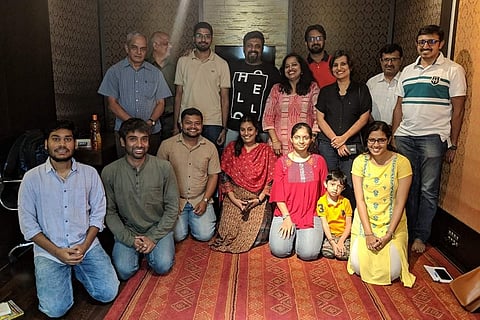

For 26-year-old Naresh Bhat, a resident of Bengaluru, July was an incredibly hectic month. Apart from his job at TCS, he had one more thing to focus on – recording textbooks in Kannada to make them more accessible to visually challenged students.
Naresh's day begins at 6:30 am when he heads to a recording studio in Indiranagar. After spending 2-3 hours reading and recording textbooks at the studio, he then makes his way to office.
"It was hectic but it was a good experience. There were multiple slots in the studio when you could go and record. I would go at 6:30 am to record and then head to the office," he says speaking to TNM.
Naresh was lending his voice to 'Kannada Dhvani', an initiative by 'Kannada Pustaka', an organisation dedicated to making Kannada textbooks accessible and inclusive.
The not-for-profit group was started in 2015 by Indian Institute of Science (IISc) graduate Rakesh Tewari, and has created a digital library of textbooks by making use of Optical Character Recognition (OCR) to scan textbooks. "The process begins with scanning the textbook and converting it into unicode text. The accuracy is around 60-70% in this step. Then the text is proofread and the text is edited, modified, and then using text-to-speech technology, we get an audio version of the book," explains Harish Narsimha, a project coordinator at Kannada Pustaka.
In June, the group launched a new drive to manually record the contents of a Kannada textbook to be used by visually challenged students. "By manually recording the contents of the textbooks, you can add the human touch that was missing in the previous automated version. We are looking to do both kinds of recordings in the future," says Harish.
The group managed to rope in popular singer-composer Raghu Dixit to the project. His studio in Indiranagar is used for recording the audio of the textbooks.
The group invited interested volunteers to send voice samples. "Raghu Dixit had put up a post asking for voice samples from interested volunteers. I sent the voice samples and was selected along with a group of 13-15 volunteers. We met Raghu Dixit and discussed which books would be read and figured out slots we can record in the studio and our own personal schedules," says Naresh.
The recording sessions began in July with Naresh tasked with voicing a Kannada textbook. "I was reading Kannada textbooks and I had to be very careful. We cannot make any mistakes whatsoever and we have to voice out everything including pointing out what is inside brackets and what is not. The aim is to make listeners understand the text and also keep it interesting for them," Naresh says, before adding, "The process made me think about the daily lives of visually challenged persons and what kind of challenges they face.”
The volunteers were helped by sound engineers and volunteers of Kannada Pustaka who helped coordinate the project. "We have almost completed recording the textbooks of Class 8, 9 and 10 students. Each textbook took about 21-24 hours and every day we held sessions for 2-3 hours with volunteers so that their throat is not strained," says Harish.
The group has managed to make as many as 21 textbooks accessible to visually challenged students and aims to continue adding textbooks to its own digital library. "The textbooks are available in the form of podcasts on our website. We are also looking to compile the audios in CDs and DVDs, and give it to schools in the state," says Harish.